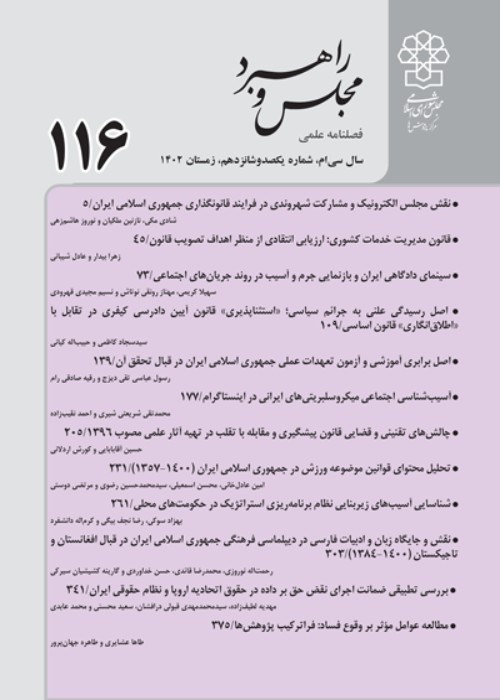فهرست مطالب

فصلنامه مجلس و راهبرد
پیاپی 56 (تابستان 1387)
- تاریخ انتشار: 1387/08/01
- تعداد عناوین: 11
-
صفحه 5
- بخش ویژه: حقوق عمومی
-
صفحه 11
-
صفحه 47
-
صفحه 187
- بخش مطالعات پارلمانی
-
صفحه 221
- بخش آزاد
-
Page 11The object of this short essay is to analyses the content of judicial security as a fundamental right. It attempts to exam in concepts and principles pertinent to this right. Hence, the concept of security has been defined in order to evaluate the notion of judicial security.Judicial security in defined as immunity which is on outcome of principles and structural arrangements such on fair trial, procedural justice and judicial neutrality. These principles themselves are considered as components of the grand principles of the "Rule of law".Ramifications of procedural fairness for the realization of judicial security such on the principles of innocence, the legality of crimes and punishments, equality before the law have been discussed. In the end, the role of judiciary in protecting and quarantining substantive rights such as freedom of expression, ownership, the rights to establishment of associations and political parties, through securing procedural judicial rights have been examined.Keywords: Security, Judicial Security, Judicial Power, Fundamental Rights, Freedoms, Rule of Law
-
Page 47In this article, at the first step I am to take the position of the government and redefinition of its role in economic and social relationships into consideration; after that the justification grounds for government intervention in economic affairs, in the light of maintaining public interest, on the basis of market failure doctrine and promotion of equality, will be described. In addition, different kinds of administrative tools should be introduced and the situation of regulation, including economic and social regulation will be justified. I will also continue with defining economic regulation and describing its types and elements. Then, this article goes on to mention to the experience of some countries in this regard. At the end, economic regulation of entry into market, price and product (output) regulation will be explained.Keywords: Economic Regulation, Social Regulation, Government Intervention, Market, Law, Economy
-
Page 85In recent decades the procedure of tacit acceptance has became prevalent in adopting amendments to the technical part of international conventions. The new formula was known as "tacit acceptance procedure", whereby amendments would come into force on a specific date contained in the amendments unless a certain specified number of states objected to the provisions. In other words, silence would be required if a state approved the new measures. The amendments do not enter into force with respect to a party who has objected to the amendment. In recent years Iran has acceded to a number of international treaties in which the tacit acceptance procedure has been accepted.Provided that being entered into force, their subsequent amendments have major legal consequences for Iranian legal system.Therefore in this essay the legal implications of tacit acceptance procedure by the constitutional law approach has been discussed and analyzed. After considering different aspects of the issue, the author concluded that using tacit acceptance procedure in approving the subsequent amendment to the treaties is contradicted to article 77 of constitution of Islamic Republic of Iran and in order to prevent the probable implications, it is necessary to adopt a special legal regime for using tacit acceptance procedure in Iranian legal system. According to Article 77 of the Iranian Constitutional; "All international conventions, protocols, treaties and pacts, shall receive approval by the parliament". While in many international treaties the right of denunciation has been provided for state parties, apparently the above article is silent on denunciation of treaties. In Iran there exists no specific study about the above mentioned issue from the Iran's constitution point of view.Therefore in this essay, legal aspect of the subject, especially in regard to determination of legal authority competent for deciding on denunciation of approved treaties from the Iranian public law viewpoint, has been considered and analyzed. Having considered different aspects of the issue, the author has reached the conclusion that since denunciation has a legislative nature, therefore it should be adopted by the Iranian Parliament.Keywords: International Treaties, Tacit Acceptance, Denunciation, Ratification, Dissolution of Treaties
-
Page 125One century of legislation could not provide us with a successful administrative decentralization. Besides social, economic, historical, and such other obstacles, local counsil in Iran as an important part of administrative decentralization program, faces with legal obstacles as well. The constitution takes an unclear position conserning standing and power of local councils and rdinary laws present an unacceptable and disagreeable dissolution process that prejudices the independence of local counsils. To remove these obstacles, in addition to make some reformations in ordinary laws, it is necessary to take a new interpretive approach to the constitution.Keywords: Local Counsils, Administrative Decentralization, National, Local Affairs, Power of Local Counsils
-
Page 145In this paper, professor Loughlin introduces and dwells on two competing theories of constitutionalism: the "normative" and the "functionalist". His analysis continues with a critical evaluation of limits of the liberal (normative) perspective in this regard. The limits are couched in the form of four tensions: tension between liberalism and democracy; tension between norm and exception; tension between identity and difference; and tension between community and cosmopolis.These tensions, Loughlin argues, could not be analysed properly unless the major and real tension between the two aforesaid theories of constitutionalism are taken into serious consideration. This in turn would make the constitutional discourse a dialectical and fruitful one.Keywords: Constitution, Constitutionalism, Constitutionalist, Constitutional Theory, Normative Theory, Realist, Functionalist Theory, Democracy, Norm, Exception, Identity, Difference, Community, Cosmopolis
-
Page 187The supreme goal of the Constitutionalism is restricting state power,preventing it from being despotic along with ensuring liberty and individual rights. Theories of Constitutionalism are mainly revolved around the constitution. According to what has been assumed about constitutionalism, constitutions cover supreme and enforceable rules of the state that determine how government should be administered. In this approach, constitution has a normative feature, even though this phenomenon in its pre-modern sense was a descriptive one, i.e. it covered the descriptive concepts including the establishment of the political system or expanding institutions. In this article, taking the history of Constitutionalism into account, the author will try to explain the controversial issue that whether it is the state that is under the rule of the constitution or vice versa?Keywords: Legislating Human Rights, Legislating, Bill of Rights, Constitution, Fundamental Rights, Procedural Justice, Individual Rights, Freedoms
-
Page 199In this paper, the author's efforts are devoted to the analysis of the "codification" by a holistic and multi-dimensional approach. In this regard, the author tries to present a classification of different types of codification upon which he can have a fair analysis. In his view, codification can be classified as follows: descriptive, conservative or signatory and prescriptive, creative or inventional. Then the author is to have a normative sketch of codification, in this respect he takes a prescriptive approach to codification, he mentions the advantages and disadvantages of this phenomenon. In his view, the advantages of codification such as transparency, compatibility, security, accessibility and the disadvantages such as legal contraction are among the most important ones. In addition, he enumerates the special advantages of two types of codification, i.e. conservative and creative. Afterwards, he tries to focus on the political, technical and legal difficulties of codification. At the end, expressing that the very codification is not an end in itself, he tries to express that it is one of the efficient mechanisms in strengthening the rule of law through simplification and reforms of the law. In order to achieve this goal, it is necessary that the executive, parliament and the jurists have a close cooperation in order to achieve the codification and simplification of law.Keywords: Codification, Law, Parliament, French Legal System
-
Page 221We want to explore the idea of "legislating human rights". What might human rights legislation be? What are its distinctive characteristics? What marks it out from other human rights instruments? How might the concept be institutionalized? Such questions present us with a number of fluid concepts that require some stipulated clarification in order to render these questions answerable.By "human rights legislation" we do not mean enacted bills of rights,which are statements of general moral principles enacted for the purpose of guiding judicial interpretation, or setting up a system of judicial review of legislation. By "human rights legislation" we mean legislation that promotes human rights in a legislative manner, that is by the enactment of a body of clear and specific rules that can be followed and applied without using broadly based moral reasoning.This normative model of legislation, and the virtues of rulegovernance associated with it, is generally derived from a democratic theory of prescriptive legal positivism.Keywords: Legislating Human Rights, Legislating, Bill of Rights, Constitution, Fundamental Rights, Procedural Justice, Individual Rights, Freedoms
-
Page 261Environmental changes make any organization plan its own growth and development program with regard to environmental conditions as well as the knowledge of opportunities, threats and internal capabilities.Quantity development, science and technology expansion, and the large number of people appreciating high education in Iran have made the authorities of High Education Department develop open education programs in the form of PAYAM E NOUR University.The new viewpoint and approach of the government toward PAYAM E NOUR University will bring a new season of quality and quantity development to this university. In such conditions, strategic view and planning are a must for dynamic and continuous momentum in this field.An introduction to open education system and its requirements will be followed, in this paper, by a history of its methodology in Iran and some select countries, together with further discussion on the strategic essentials of PAYAM E NOUR UniversityKeywords: Open Education, Virtual Education, Online Education, Self, Education, Strategy
-
Page 277Value added tax belongs to the category of taxes imposed on goods and services, which has been considered by world countries in recent decades. In Iran, too, it is introduced as one of the governmental plans for improving tax structure. The present paper reviews the implementary policies and measures needed to create an appropriate context for the successful imposition of value added tax in Iran. Investigating the ideal economic conditions and tax structure for imposing value added tax confirms the fact that the best strategy to impose such a tax in Iran would be a midterm or gradual implementation policy. The related implementary measures are mentioned here in terms of individual executive organizations;some legal obligations are also discussed.Keywords: Tax, Value Added, Value Added Tax (VAT), Economic Conditions, Tax Structure


